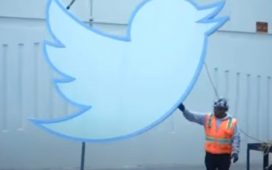US lawmakers held a combative hearing on Wednesday with former senior staffers at Twitter over the social media platform’s handling of reporting on Joe Biden’s son Hunter Biden.
The proceedings set the stage for the agenda of a newly Republican-controlled House, underscoring its intention to hone in on longstanding and unsubstantiated allegations that big tech platforms have an anti-conservative bias.
The House oversight committee called for questioning recently departed Twitter employees including Vijaya Gadde, the social network’s former chief legal officer, former deputy general counsel James Baker, former head of safety and integrity Yoel Roth and former safety leader Anika Collier Navaroli.
The hearing centered on a question that has long dogged Republicans – why Twitter decided to temporarily restrict the sharing of a story about Hunter Biden in the New York Post, released in October 2020, the month before the US presidential election. But lawmakers on both sides of the aisle used the opportunity to interrogate moderation practices at Twitter and other tech firms.
“The government doesn’t have any role in suppressing speech,” said Republican committee chairman James Comer, hammering the former employees for censoring the Post story.

In that report, the Post said it received a copy of a laptop hard drive from Donald Trump’s then-personal attorney, Rudy Giuliani, that Hunter Biden had dropped off 18 months earlier at a Delaware computer repair shop and never retrieved. Twitter initially blocked people from sharing links to the article for several days, citing concerns over misinformation and spreading a report containing potentially hacked materials.
In opening statements on Wednesday, the former Twitter staffers described the process by which the story was blocked. While the company explicitly allowed “reporting on a hack, or sharing press coverage of hacking”, it blocked stories that shared “personal and private information – like email addresses and phone numbers” – which the Post story appeared to include. The platform amended these rules following the Biden controversy, and the then CEO, Jack Dorsey, later called the company’s communications about the Post article “not great”.
Roth, the former head of safety and integrity, said on Wednesday that Twitter acknowledged that censoring the story was a mistake.
“Defending free expression and maintaining the health of the platform required difficult judgment calls,” he said. “There is no easy way to run a global communications platform that satisfies business and revenue goals, individual customer expectations, local laws and cultural norms and get it right every time.”

Elon Musk, who purchased the company last year, has since shared a series of internal records, known as the Twitter Files, showing how the company initially stopped the story being shared, citing concerns from the Biden campaign, among other factors.
Republican theories that Democrats are colluding with big tech to suppress conservative speech have become a hot button issue in Washington, with congress members using various tech hearings to grill executives. But experts say claims of anti-conservative bias have been disproven by independent researchers.
“What we’ve seen time and again is that companies are de-platforming people who are spreading racism and conspiracy theories in violation of the company’s rule,” said Jessica J González, co-chief executive officer of the civil rights group Free Press.
“The fact that those people are disproportionately Republicans has nothing to do with it,” she added. “This is about right or wrong, not left or right.”
Musk’s decision to release information about the laptop story comes after he allowed the return of high-profile figures banned for spreading misinformation and engaging in hate speech, including the former president. The executive has shared and engaged with conspiracy theories on his personal account.
Republican lawmakers seem to have found an ally in Musk, and repeatedly praised him during Wednesday’s proceedings. The rightwing congresswoman Marjorie Taylor Greene used her time on the floor to personally attack the former Twitter employees and complain about her own account, which was suspended for violating the platform’s policies on coronavirus misinformation.
“I’m so glad you’ve lost your jobs,” she said. “I am so glad Elon Musk bought Twitter.”

But Democrats on Wednesday used their time in the House to explore how the Trump administration engaged with Twitter, revealing that the former president himself tried to interfere with content decisions.
In response to questioning from the new representative Maxwell Frost of Florida, the former Twitter content moderation executive Navaroli confirmed that in 2019 Trump tried to have an insulting tweet from internet personality Chrissy Teigen removed from the platform. In the tweet, which was read for the record, Teigen referred to Trump as a “pussy ass bitch”. Twitter denied the White House’s request, and it remains online today.
Representative Alexandria Ocasio-Cortez further sought to disprove bias against conservative speech on Twitter when she asked about an instance in 2019, when a tweet from Trump including hate speech was kept online despite violating platform policies.
The former president told Democratic congresswomen to “go back” to their countries, a clear violation of Twitter’s policies regarding abuse against immigrants, but was not penalized, Navaroli confirmed, and the rules were changed.
“So Twitter changed their own policy after Trump violated it to accommodate his tweets?” Ocasio-Cortez said. “So much for bias against the rightwing on Twitter.”
The White House has sought to discredit the Republican investigation into Hunter Biden, calling them “divorced-from-reality political stunts”. Nonetheless, Republicans now hold subpoena power in the House, giving them the authority to compel testimony and conduct an aggressive investigation.
In opening statements at Wednesday’s hearing, Democratic representative Jamie Raskin of Maryland expressed frustration that the first tech-focused panel of the session is focused on the Hunter Biden story, which he called a “faux scandal”. He said private companies under the first amendment are free to decide what is allowed on their platforms.
“Silly does not even begin to capture this obsession,” he said of the laptop story. “What’s more, Twitter’s editorial decision has been analyzed and debated ad nauseam. Some people think it was the right decision. Some people think it was the wrong decision. But the key point here is that it was Twitter’s decision.”
The Associated Press contributed reporting











